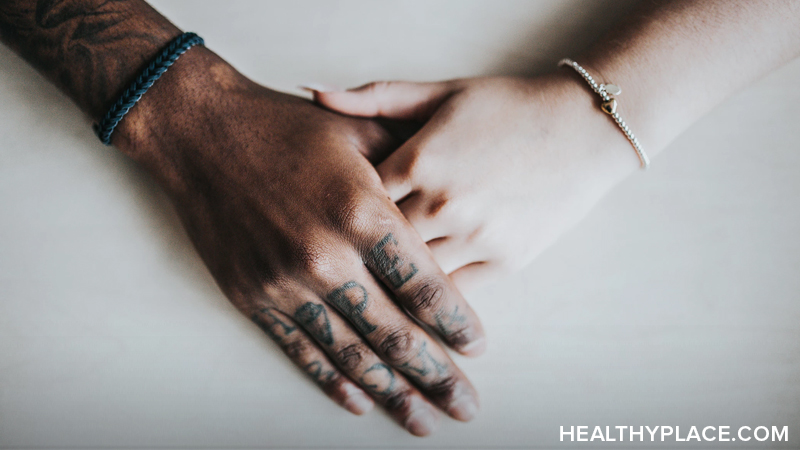Anxiety and Romantic Relationships: How to Help Your Anxiety-Ridden Partner

Anxiety and romantic relationships are a frustrating combination. If you are in a loving relationship with someone you care about, it’s difficult to watch them struggle with anxiety. When you care about someone, it’s natural to want to help them, to make their anxiety better. Further, anxiety can become an unwelcome extra partner who tries to take over the relationship. Romantic relationships and anxiety present a triple whammy: Your partner is plagued by anxiety and its life-limiting effects; you face the challenge of wanting to help your anxiety-ridden partner, and the relationship between the two of you suffers, too.
Anxiety in dating relationships or any kind of love relationship is trying. No one wants to see a loved one suffer. Here, we’ll explore how to help a loved one with anxiety as well as examine some ways you can care for yourself, too. As miserable a combination as anxiety and romantic relationships can be, it’s possible for each partner and the relationship itself to thrive.
Anxiety and Romantic Relationships: Dos and Don’ts for Helping Your Anxious Partner
Key concepts for helping your partner reduce their anxiety can be remembered with the acronym LACE-C (pronounced “lacey).
- L: Listening
- A: Acceptance
- C: Compassion
- E: Empathy
- C: Communication
Together, these form the foundation of what you can do to help your partner with anxiety. Of course, these concepts are important in all relationships, but when anxiety is part of a romantic relationship, these principles guide healing so everyone can move forward.
Listening is a skill that helps your partner feel heard. They feel secure sharing their anxieties with you, and when they open up, you can help alleviate their fears.
Acceptance of your partner is also called unconditional positive regard, or unconditional love. Letting go of “shoulds,” rules for how you think your partner should be, how you think you should be, and how you think the relationship should be helps you live in your real world rather than in your head with troubled thoughts.
When you exist in the present moment with your partner without evaluating them or their anxiety, you’re practicing acceptance. When people feel accepted, anxiety decreases and peace and contentment increase. This is true for your partner, you, and the relationship.
Compassion involves a nonjudgmental approach to your partner when they are riddled with intense anxiety. Compassion allows you to separate your partner from their anxiety, loving the person for who they are.
Empathy is similar to compassion, but is slightly different. Empathy is being able to put yourself in your partner’s shoes and seek to understand what it would feel like to go through what they are experiencing. Empathy involves shared feelings and deep understanding.
Communication is one of the most important components of any relationship and is especially important when one partner has anxiety. When you both agree to be open and honest, you can work through almost any difficulty. The best way to know what your partner needs for anxiety support is to ask. The best way to understand your partner’s specific anxieties is to listen and allow them to tell you.
Some things that don’t help—and actually hurt—a relationship include:
- Trying to be your partner’s therapist, all day every day
- Taking your partner’s anxiety personally
- Your partner taking your communication personally
- Criticizing
- Blaming
- Impatience
- Anger
- Accusations
- Enabling
- Coddling
- Reacting rather than stopping, thinking, and responding intentionally
Anxiety and Romantic Relationships: Don’t Forget Yourself
No matter how much you love your partner, anxiety can be a huge relationship challenge. Often, the partner without anxiety takes on a lot of responsibilities: helping their partner, taking care of many household chores, shopping, parenting (if kids are involved), and being the sole source of income (if anxiety prevents the other partner from working).
Practicing self-care and loving and supporting yourself the way you do your partner is important for your own mental health and wellbeing. Some ways to do this:
- Take breaks by engaging in your own interests and hobbies
- Form your own support system (family, friends, a support group)
- See a therapist for your own needs
- Set boundaries: what you can and can’t do
- Don’t allow your partner to mistreat you. Anxiety isn’t a license for terrible treatment ("How Abusive Relationships Cause Anxiety").
Anxiety and romantic relationships may seem like a bad combination; however, a relationship in which one partner has anxiety can blossom and thrive. With mutual support and concern, anxiety will shrink out of the way.
APA Reference
Peterson, T.
(2021, December 20). Anxiety and Romantic Relationships: How to Help Your Anxiety-Ridden Partner, HealthyPlace. Retrieved
on 2026, March 4 from https://www.healthyplace.com/anxiety-panic/relationships/anxiety-and-romantic-relationships-how-to-help-your-anxiety-ridden-partner



